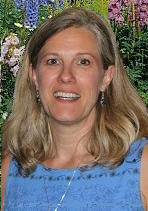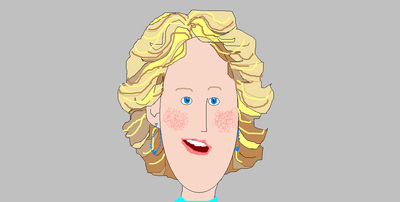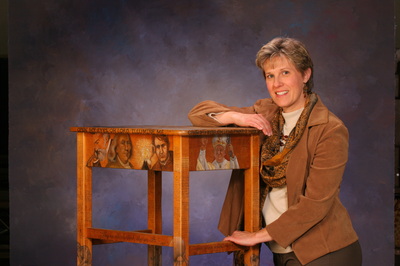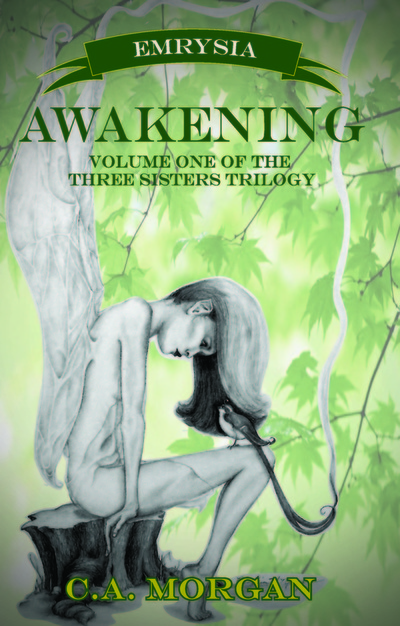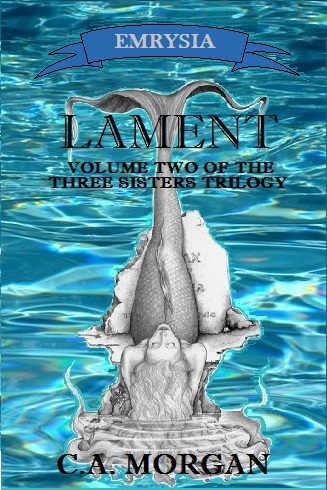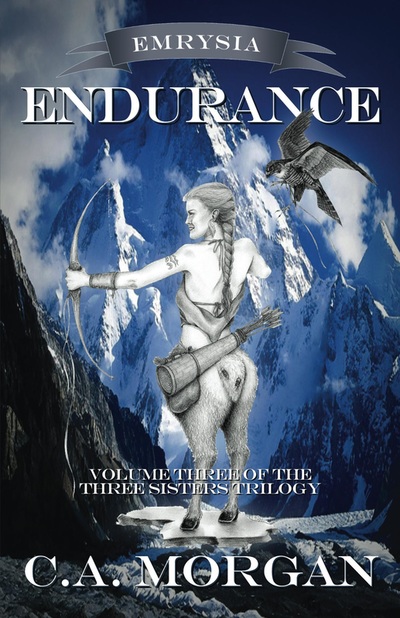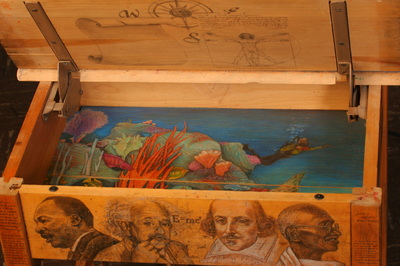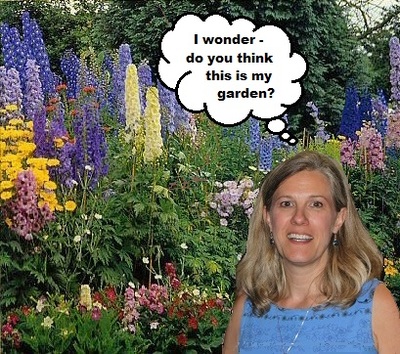Interview with C. A. Morgan
Q: What is the greatest joy of writing for you?
A: Seeing characters develop in unexpected ways, sometimes characters and plotlines that I never anticipated taking on a life of their own. And I love tying up loose ends. Going back in and connecting the dots is very satisfying, hopefully for my readers too.
Q: What is your writing process?
A: Part organized mess, part.... no.... it's all organized mess. Emrysia Awakening started percolating when I was drawing the image of Aryelle used on the cover. That was -argh!- over twenty-five years ago! Over the course of many too-busy-to-write years, I'd jot down ideas on whatever scrap of paper was handy. I've actually still got some. When I finally decided in earnest to sit down and write, I started by creating the Empayan language and a five generation genealogy. Each character had to have a back story. At first, I thought the book was going to be about Aryelle's parents, but then, as often happens, this plucky teenager and her drama took center stage. I came up with outlines for most of it, but when storylines unexpectedly present themselves, I like to head down the path to see where it leads. Sometimes I turn around and come back to the original idea, but more often than not, the new path is much more interesting. But nothing is wasted. I have pages of text that will someday flesh out the story, I just don't know exactly where yet. It's an intuition thing, I guess, this following where life takes you. You can plan all you want, but you never see around the bend.... Anyhow, once the book was written, I had advance readers give me feedback. I did several edits, which I actually enjoyed, and have even tweaked it once or twice since it was first published.
Q: What are you working on next?
A: I self-published the first two volumes of The Three Sisters Trilogy, Emrysia Series: Awakening & Lament with the help of local presses, but Volume Three, out last spring, was my first home birth. I guess that makes me a publishing house! It has been amazing (and often frustrating) learning the ropes, but I'm really excited to share Emrysia with the world. I've got a prequel and sequel planned to round out the series, but there are a couple of other projects I've been working on simultaneously that I'm working on getting out there. And about a dozen other novels I've dreamed up and haven't gotten to, but will someday.
Q: Do you remember the first story you ever read, and the impact it had on you?
A: When I was in second grade I read a story out of my brother's tenth grade English book called "The Fifty-first Dragon". It was about an apprentice dragon-slayer with a magic word that helped him overcome his fear. The fiftieth dragon he encountered - a decrepit, sly serpent - made him forget the word, but the boy beheaded the dragon regardless. His confidence was shaken rather than reinforced, and the next time he went out to meet a dragon, he never returned. I couldn't understand. I had thought the moral would be that the power was always within him, and I guess it was, even though the boy didn't recognize it. That story taught me the power of having confidence in your own abilities. But it also made me decide that if I wanted a more satisfactory ending, I would have to write it myself.
Q: What inspires you to get out of bed each day?
A: My family, and looking forward to a day of creating in whatever form it happens to take.
Q: Who are your favorite authors?
A: Of course, J. K. Rowling - love her attention to detail! - C. S. Lewis, J. R. R. Tolkien, M. T. Anderson (I'm sensing a pattern), Mark Helprin, Mary Doria Russell, Jane Austen and the Bronte sisters, Suzanne Collins, Alan Bradley --- everybody really, and most every genre as long as it is well written.
Q: What makes a good or bad writer?
A: As a writer, it's easy to come up with ideas - the challenge is conveying them. It's quite miraculous really, taking a thought and giving it flesh, then serving it up for others to savor - or spit out! - as the case may be. A good writer draws you into the story and lets you peek inside the characters' heads. They make you feel as if this world or situation you've stumbled upon is more real than your own. They help you lose (or find) yourself in the pages. And they leave you satisfied, but longing for more. A GREAT writer not only gives you something to feast on, but makes the feast so memorable you'll want to repeat it over and over again. There are books I've read a dozen times or more and always pulled something new from them. And then there are those where I love the plot line and hate the writing style. Poor grammar is a major turn-off, as are glaring errors or botched edits that pull you out of the story.
Q: When you're not writing, how do you spend your time?
A: Too often, not how I'd like to be spending it! I'm an artist first and could loose myself doodling, though I could never limit myself to a particular medium. One day I might be working with clay, the next carving or painting on wood, and after that doing a pencil sketch for a pen & ink portrait or iconographic caricature. Lately, I've been teaching adult painting parties at a gorgeous country inn - it's so fun!
Q: What would you consider a perfect day?
A: The perfect day would be spent making art, writing, whipping up some culinary delight and sipping good wine with friends after snuggling with my husband and kids. I'd spend less time than I do now just trying to navigate technology, and more time in my garden.
Q: Do you remember the first story you ever wrote?
A: Not the first one I ever wrote, but the first one I ever sold was about an incident where I had to stay after school and wash desks that I'd doodled all over. Only in my story, I got pulled into one of my drawings...
Q: Describe your desk.
A: Even though I prefer everything in neat piles, at the moment my desk is covered with the detritus of a busy family. There are stacks of books, scribbled on calendars, napkins, notebooks and scraps of paper, dead batteries, a set of two pound weights, a camera with charge cord, someone's purple ear buds, a broken toy and missing puzzle piece, more books, family photos, a plaque of my book cover (thank you, Hubby - he also made the desk itself!), framed inspirational quotes, various office and artist supplies, a wooden block puzzle I created with a different family member on each side - but currently a jumbled Picasso mess!, my unfortunately empty coffee mug on an offspring-created pot holder, and an empty box just the right size to tempt the cat from sitting on my keyboard. (Note: I love the image this created so I left it in, but our poor cat, sadly, ran out of lives a couple of summers ago. I still miss her.) And, of course, the computer. I'm sure I missed something, but I'm trying not to look too closely.
Q: Where did you grow up, and how did this influence your writing?
A: I grew up in the Midwest on a farm in the middle of nowhere, except it was only a half mile from a State Park, so practically lived at the lake. I was one of nine kids, and we didn't have a lot of material wealth. I spent most of my time outside, often alone just trying to have space, and it gave me a lot of time to just think about things.
Q: What motivated you to become a self-published author?
A: All of this is new - publishing in general - and I figured that if I can write a book while raising a houseful of kids, I can conquer my fear of technology and marketing too.
Q:Has it contributed to your success?
A: Don't know yet - I'll get back to you on that one. But it has definitely contributed to my happiness!
Q: What is the greatest joy of writing for you?
A: Seeing characters develop in unexpected ways, sometimes characters and plotlines that I never anticipated taking on a life of their own. And I love tying up loose ends. Going back in and connecting the dots is very satisfying, hopefully for my readers too.
Q: What is your writing process?
A: Part organized mess, part.... no.... it's all organized mess. Emrysia Awakening started percolating when I was drawing the image of Aryelle used on the cover. That was -argh!- over twenty-five years ago! Over the course of many too-busy-to-write years, I'd jot down ideas on whatever scrap of paper was handy. I've actually still got some. When I finally decided in earnest to sit down and write, I started by creating the Empayan language and a five generation genealogy. Each character had to have a back story. At first, I thought the book was going to be about Aryelle's parents, but then, as often happens, this plucky teenager and her drama took center stage. I came up with outlines for most of it, but when storylines unexpectedly present themselves, I like to head down the path to see where it leads. Sometimes I turn around and come back to the original idea, but more often than not, the new path is much more interesting. But nothing is wasted. I have pages of text that will someday flesh out the story, I just don't know exactly where yet. It's an intuition thing, I guess, this following where life takes you. You can plan all you want, but you never see around the bend.... Anyhow, once the book was written, I had advance readers give me feedback. I did several edits, which I actually enjoyed, and have even tweaked it once or twice since it was first published.
Q: What are you working on next?
A: I self-published the first two volumes of The Three Sisters Trilogy, Emrysia Series: Awakening & Lament with the help of local presses, but Volume Three, out last spring, was my first home birth. I guess that makes me a publishing house! It has been amazing (and often frustrating) learning the ropes, but I'm really excited to share Emrysia with the world. I've got a prequel and sequel planned to round out the series, but there are a couple of other projects I've been working on simultaneously that I'm working on getting out there. And about a dozen other novels I've dreamed up and haven't gotten to, but will someday.
Q: Do you remember the first story you ever read, and the impact it had on you?
A: When I was in second grade I read a story out of my brother's tenth grade English book called "The Fifty-first Dragon". It was about an apprentice dragon-slayer with a magic word that helped him overcome his fear. The fiftieth dragon he encountered - a decrepit, sly serpent - made him forget the word, but the boy beheaded the dragon regardless. His confidence was shaken rather than reinforced, and the next time he went out to meet a dragon, he never returned. I couldn't understand. I had thought the moral would be that the power was always within him, and I guess it was, even though the boy didn't recognize it. That story taught me the power of having confidence in your own abilities. But it also made me decide that if I wanted a more satisfactory ending, I would have to write it myself.
Q: What inspires you to get out of bed each day?
A: My family, and looking forward to a day of creating in whatever form it happens to take.
Q: Who are your favorite authors?
A: Of course, J. K. Rowling - love her attention to detail! - C. S. Lewis, J. R. R. Tolkien, M. T. Anderson (I'm sensing a pattern), Mark Helprin, Mary Doria Russell, Jane Austen and the Bronte sisters, Suzanne Collins, Alan Bradley --- everybody really, and most every genre as long as it is well written.
Q: What makes a good or bad writer?
A: As a writer, it's easy to come up with ideas - the challenge is conveying them. It's quite miraculous really, taking a thought and giving it flesh, then serving it up for others to savor - or spit out! - as the case may be. A good writer draws you into the story and lets you peek inside the characters' heads. They make you feel as if this world or situation you've stumbled upon is more real than your own. They help you lose (or find) yourself in the pages. And they leave you satisfied, but longing for more. A GREAT writer not only gives you something to feast on, but makes the feast so memorable you'll want to repeat it over and over again. There are books I've read a dozen times or more and always pulled something new from them. And then there are those where I love the plot line and hate the writing style. Poor grammar is a major turn-off, as are glaring errors or botched edits that pull you out of the story.
Q: When you're not writing, how do you spend your time?
A: Too often, not how I'd like to be spending it! I'm an artist first and could loose myself doodling, though I could never limit myself to a particular medium. One day I might be working with clay, the next carving or painting on wood, and after that doing a pencil sketch for a pen & ink portrait or iconographic caricature. Lately, I've been teaching adult painting parties at a gorgeous country inn - it's so fun!
Q: What would you consider a perfect day?
A: The perfect day would be spent making art, writing, whipping up some culinary delight and sipping good wine with friends after snuggling with my husband and kids. I'd spend less time than I do now just trying to navigate technology, and more time in my garden.
Q: Do you remember the first story you ever wrote?
A: Not the first one I ever wrote, but the first one I ever sold was about an incident where I had to stay after school and wash desks that I'd doodled all over. Only in my story, I got pulled into one of my drawings...
Q: Describe your desk.
A: Even though I prefer everything in neat piles, at the moment my desk is covered with the detritus of a busy family. There are stacks of books, scribbled on calendars, napkins, notebooks and scraps of paper, dead batteries, a set of two pound weights, a camera with charge cord, someone's purple ear buds, a broken toy and missing puzzle piece, more books, family photos, a plaque of my book cover (thank you, Hubby - he also made the desk itself!), framed inspirational quotes, various office and artist supplies, a wooden block puzzle I created with a different family member on each side - but currently a jumbled Picasso mess!, my unfortunately empty coffee mug on an offspring-created pot holder, and an empty box just the right size to tempt the cat from sitting on my keyboard. (Note: I love the image this created so I left it in, but our poor cat, sadly, ran out of lives a couple of summers ago. I still miss her.) And, of course, the computer. I'm sure I missed something, but I'm trying not to look too closely.
Q: Where did you grow up, and how did this influence your writing?
A: I grew up in the Midwest on a farm in the middle of nowhere, except it was only a half mile from a State Park, so practically lived at the lake. I was one of nine kids, and we didn't have a lot of material wealth. I spent most of my time outside, often alone just trying to have space, and it gave me a lot of time to just think about things.
Q: What motivated you to become a self-published author?
A: All of this is new - publishing in general - and I figured that if I can write a book while raising a houseful of kids, I can conquer my fear of technology and marketing too.
Q:Has it contributed to your success?
A: Don't know yet - I'll get back to you on that one. But it has definitely contributed to my happiness!
